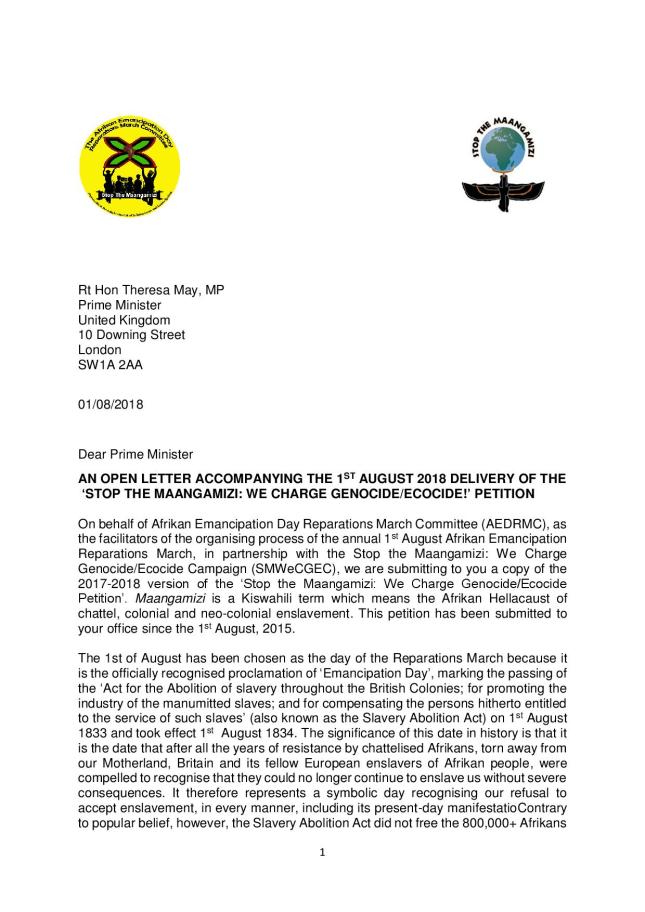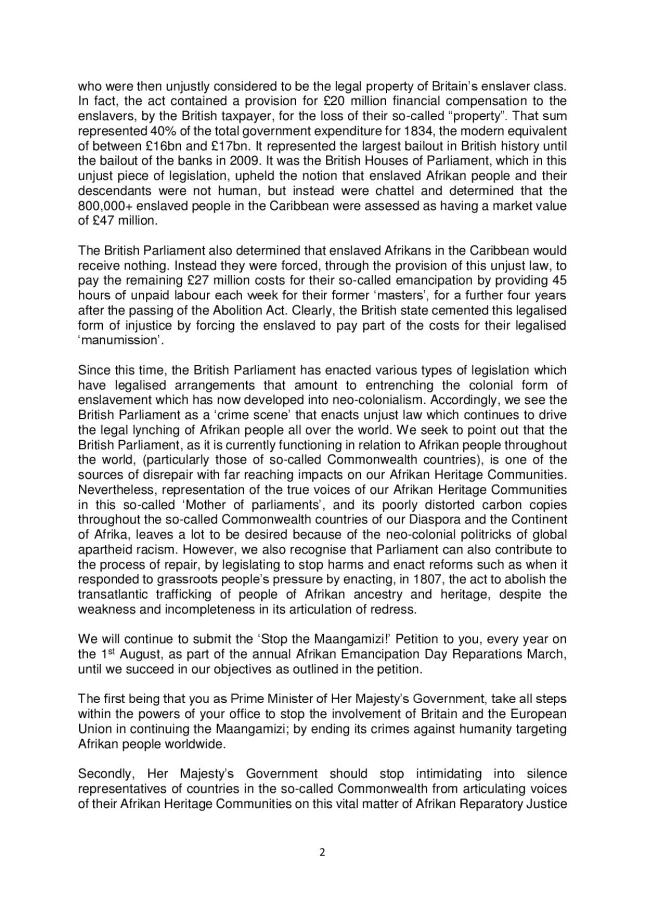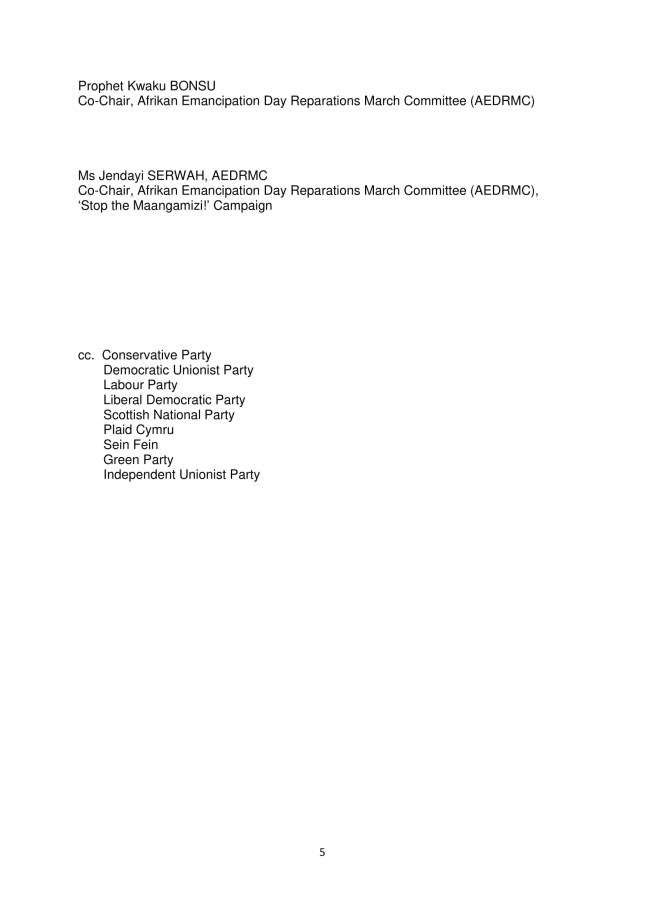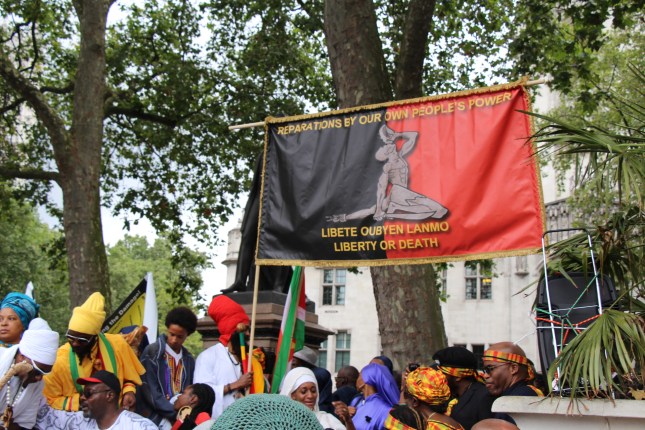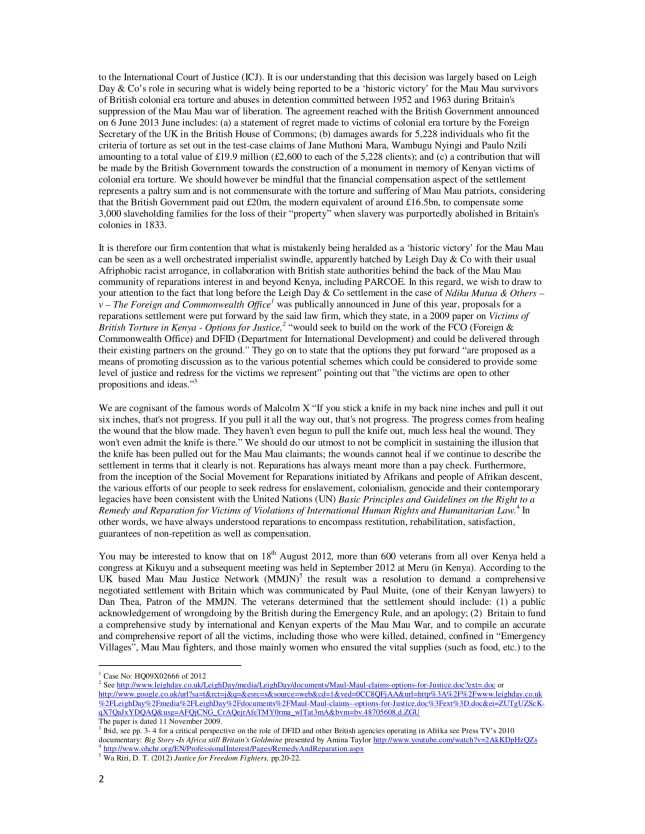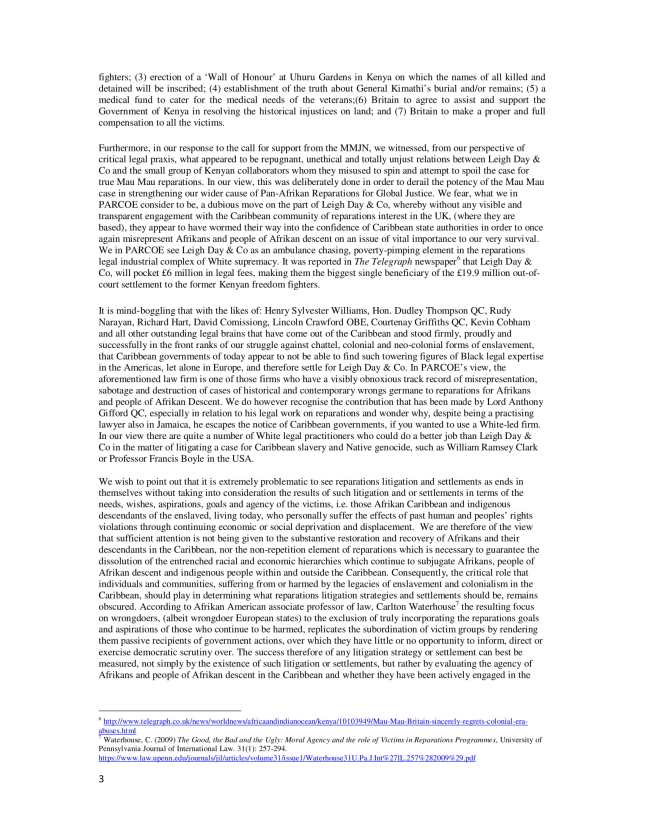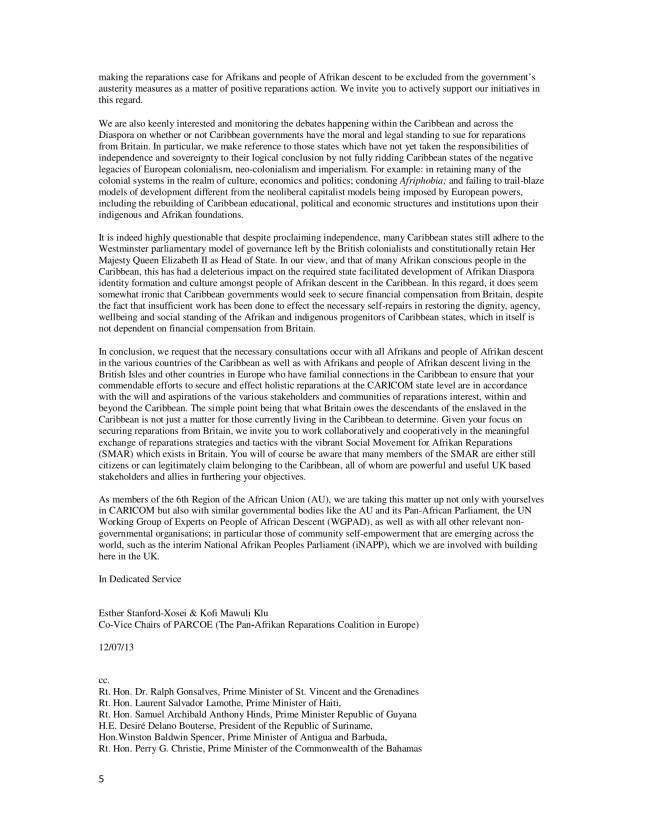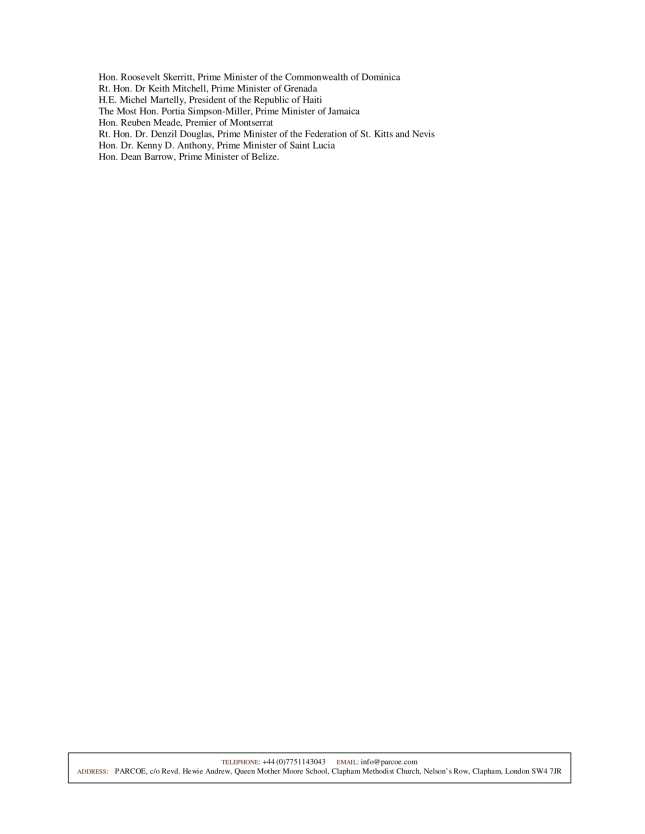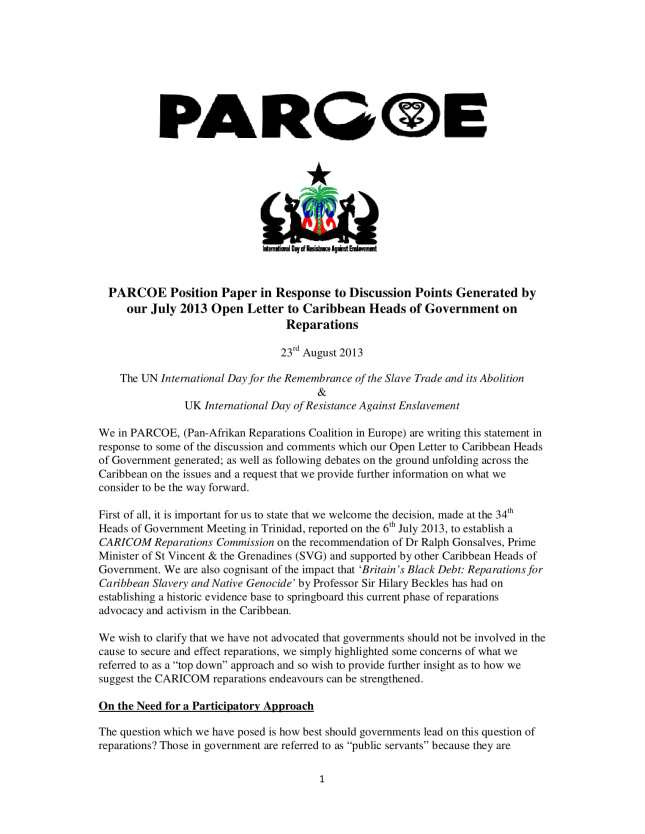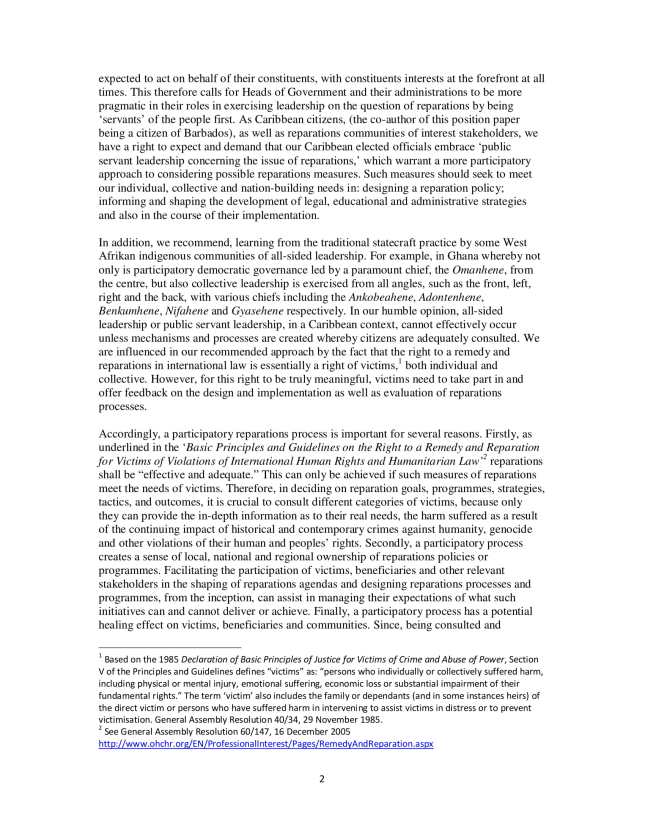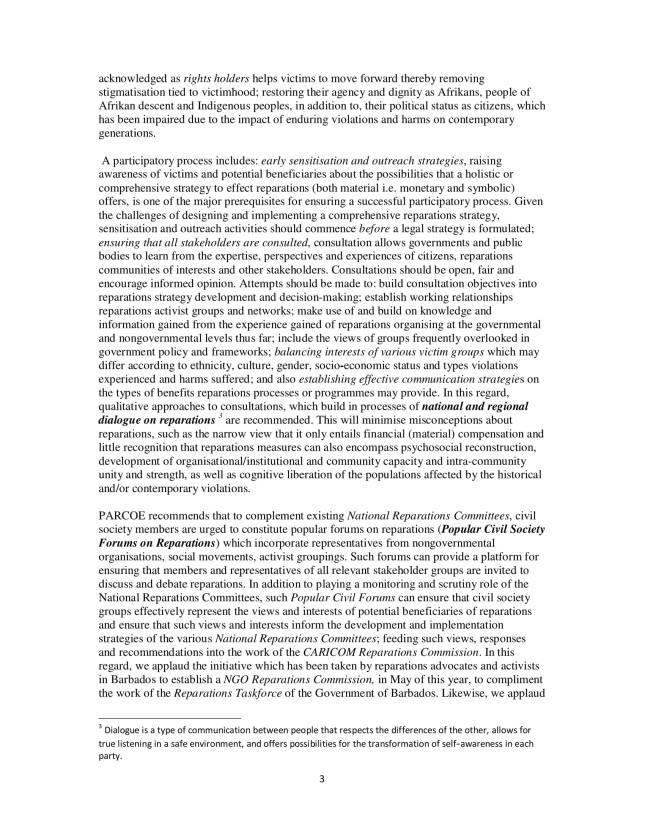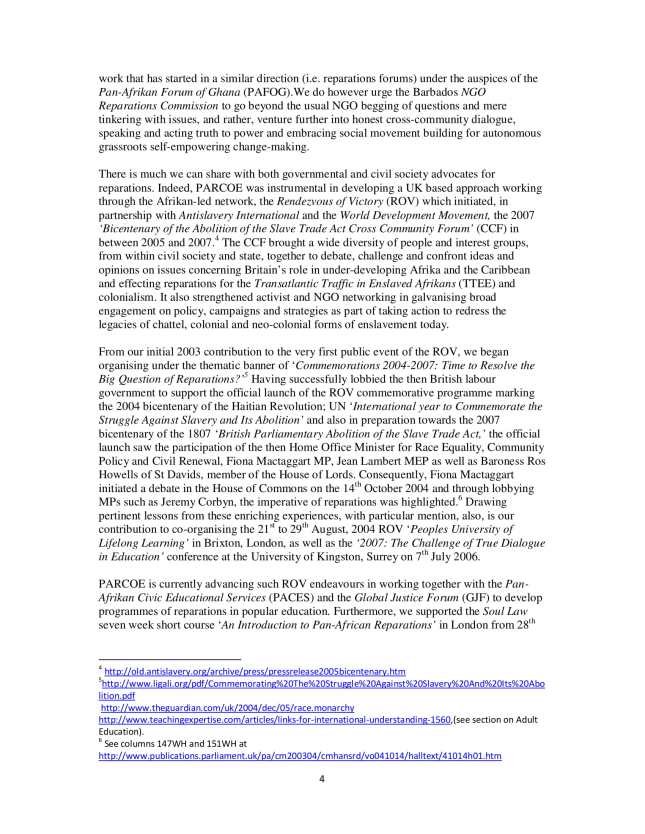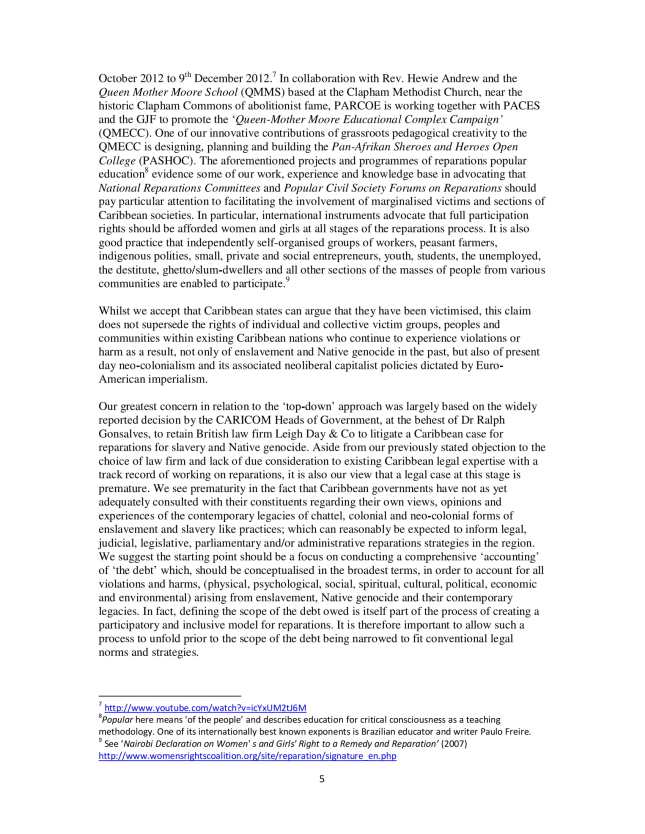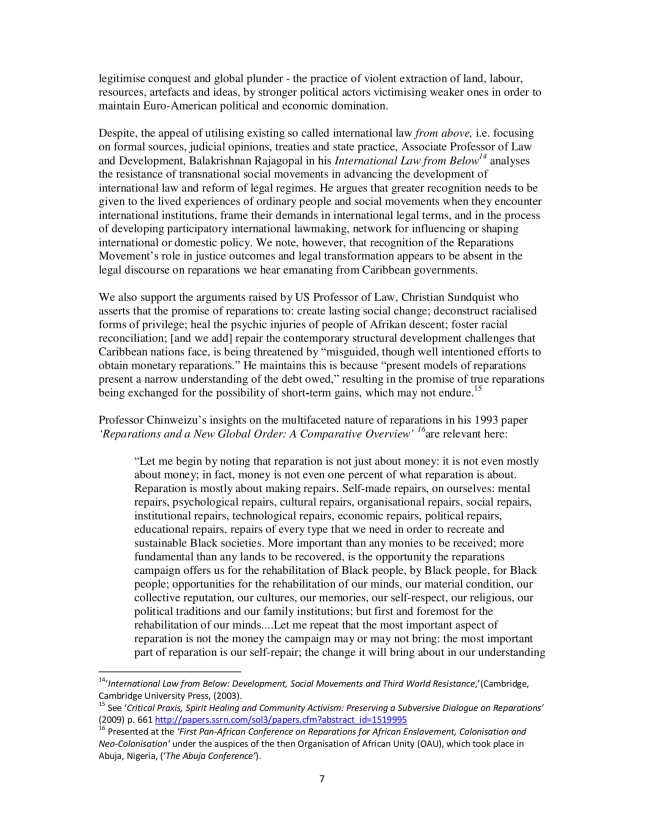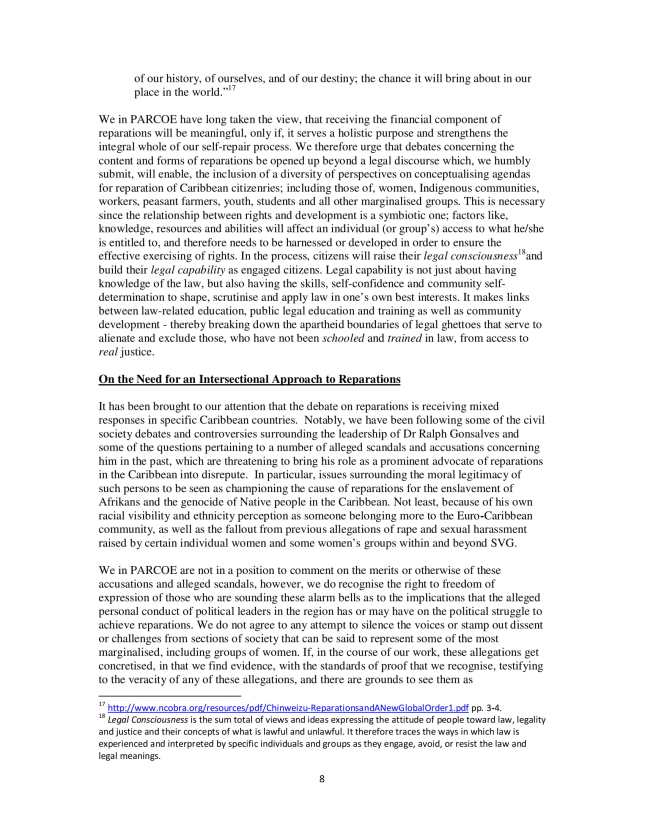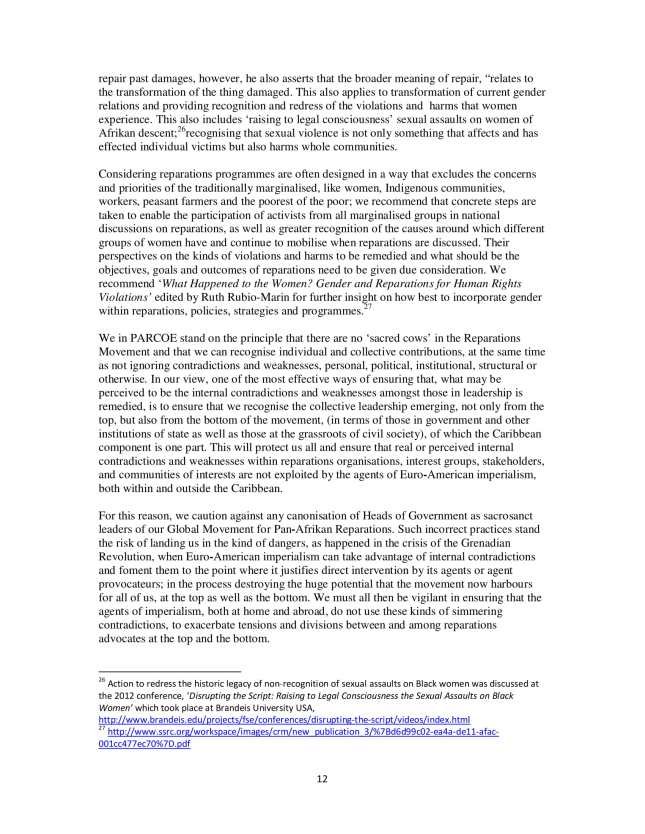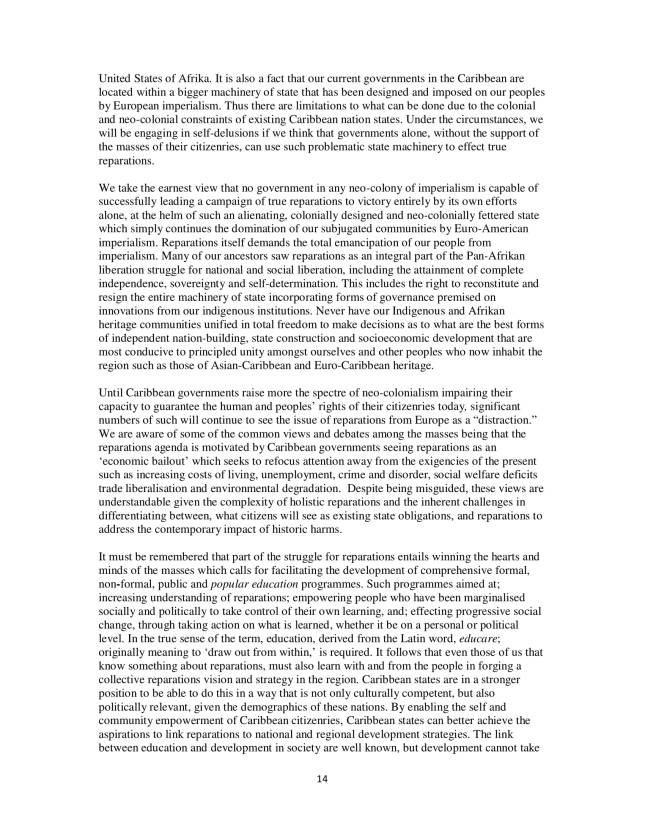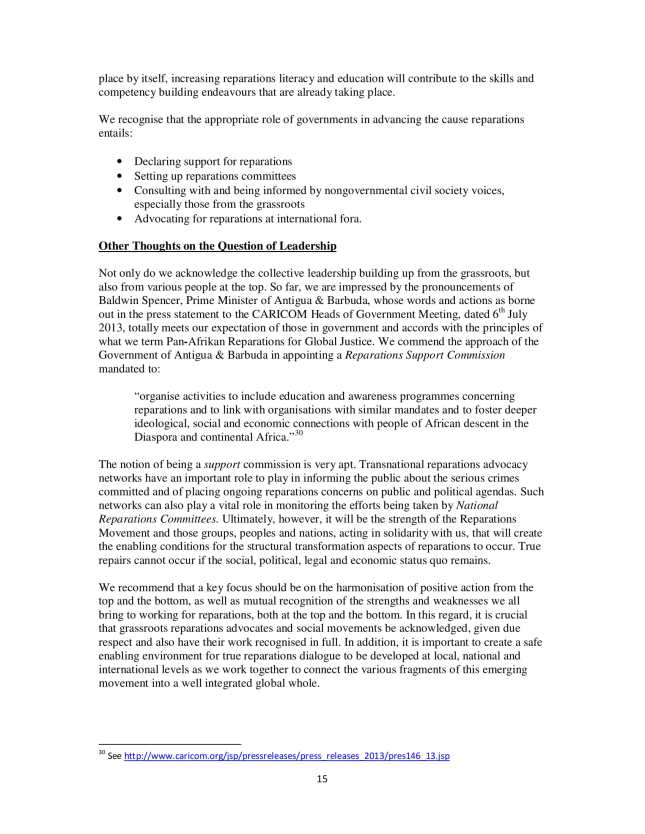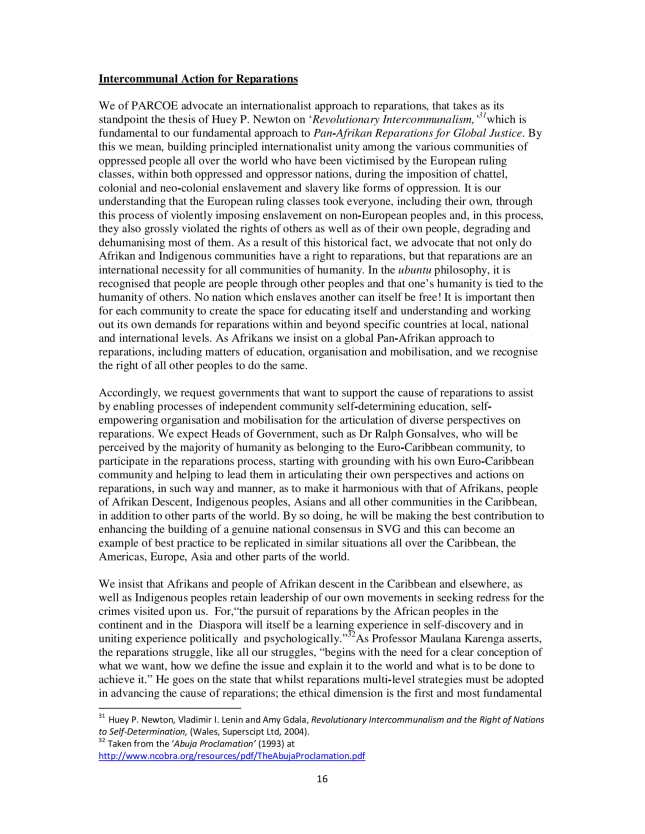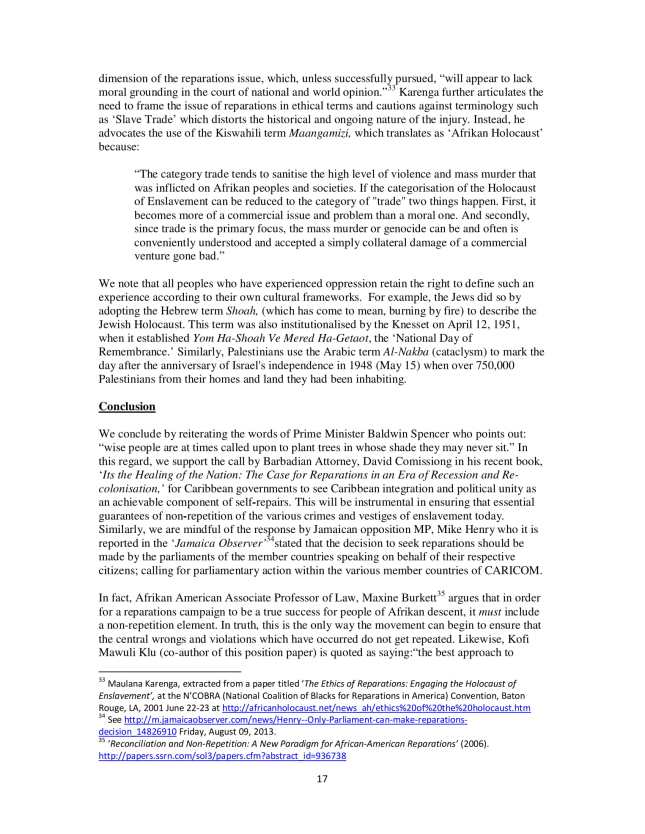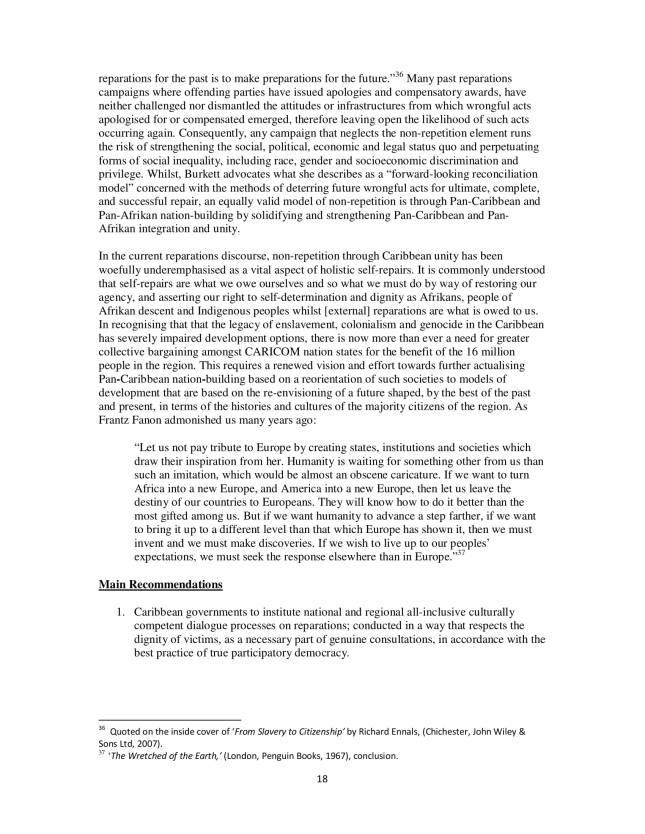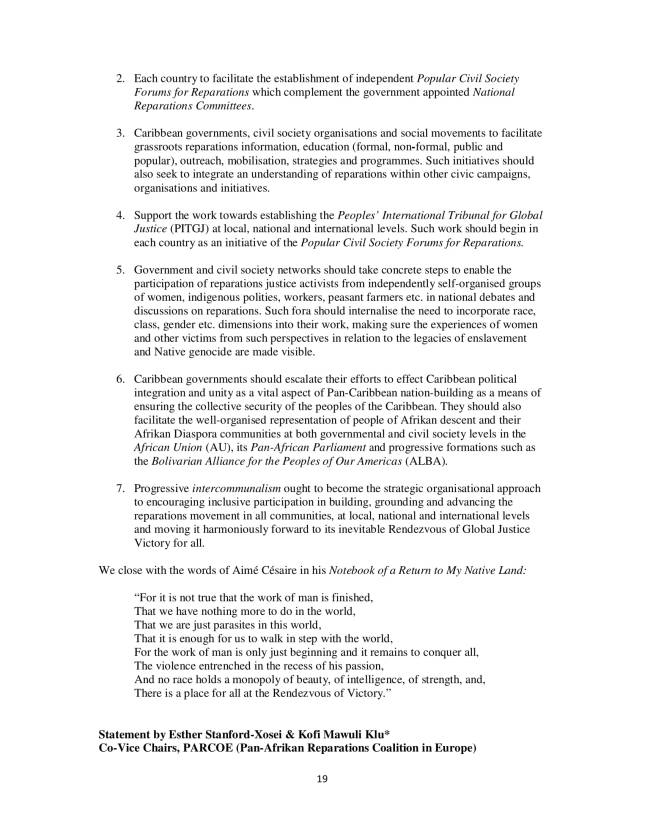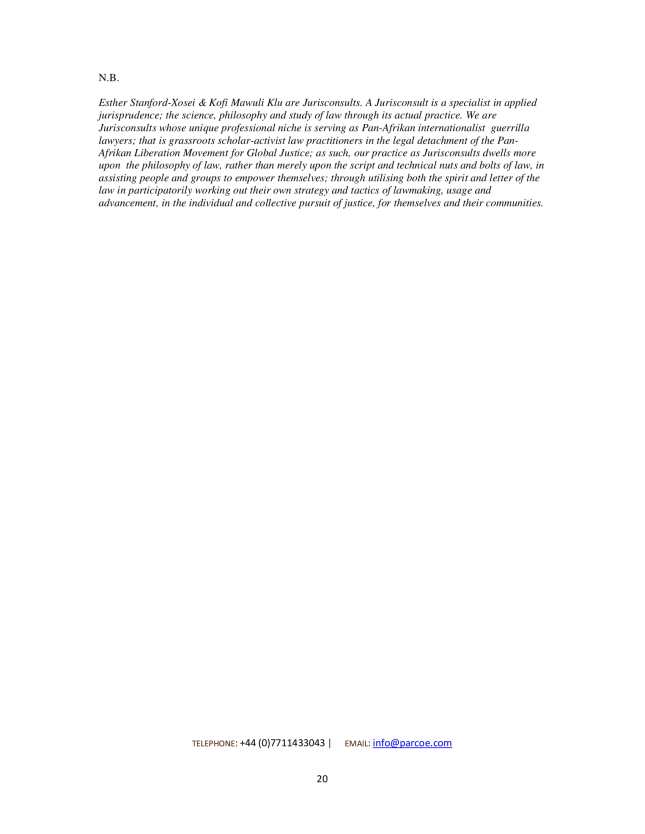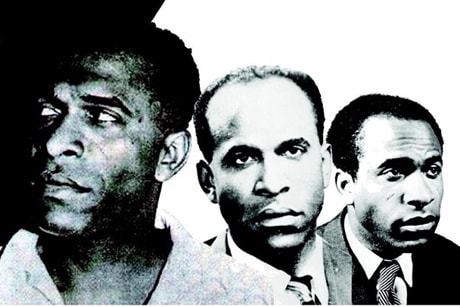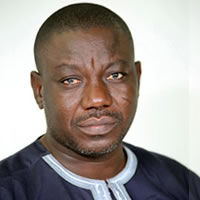AN ISMAR UK DIALOGUE IN LONDON WITH CARICOM – NATIONAL COUNCIL ON REPARATION IN JAMAICA (JNCR): AN INITIAL REPORT-BACK
DIALOGUE DATE : 14 NOVEMBER 2017

*ISMAR stands for International Social Movement for Afrikan Reparations
Including:
1. Professor Verene Shepherd: Scholar-Activist Co-Chair of the Jamaica National Council on Reparation (JNCR), Director of the UWI – Centre for Reparation Research, Independent Expert at the UN Committee on the Elimination of Racial Discrimination.
2. Bert Samuels: Pan-Afrikanist Attorney-at-Law, Head of JNCR Legal Working Group.
3. Lord Anthony Gifford QC: Attorney-At-Law, Member of Queen’s Commission, Member of JNCR, Citizen of Jamaica since 1990’s, involved with reparations since days of mentor Bernie Grant, MP.
“Dialogue is a form of struggle. It is not a chit chat. Create a dialogue that focuses not just on the vulnerability of all groups, but on those larger issues of justice, democracy and the crisis within our own communities then try to hammer out some everyday problems that relate to the everyday lives of those groups”
Professor Cornel West
Purpose of the Meeting
The meeting started with introductions and a reminder of the purpose of the deliberations:
1: The status of the reparatory justice movement in the UK and Jamaica (update on both sides);
2: What strategies have worked and why? What strategies have not worked and why?;
3. The way forward.
It was reiterated that this meeting is a dialogue and, notwithstanding the limits of time, participants should adhere to and help reinforce the principles of dialogue. Communication agreements were highlighted: it was emphasized that people should speak from their own reality, speak in their name, from their own point of view and also realise that we are here to share as well as listen to others; and that in doing, so we do not all have to agree with each other.
From the JNCR
Professor Shepherd made some preliminary comments. She recognised that there were some misgivings and acknowledged that some of the participants had previously sent in their issues of concern in advance of the meeting. She stated that they would not be able address all the points and issues that had been sent in advance from some parties in the dialogue but emphasized that this is not the only trip the delegation will make. She informed the gathering that she is head of the JNCR Diaspora and International Engagement Working Group. There is another JNCR working group which is the Internal Reparations and Internal Engagement Working Group for Postcolonial Wrongs committed by post-colonial regimes like Coral Gardens. So, the JNCR is working externally and internally.
Professor Shepherd acknowledged that there were lots of questions about the CARICOM Reparations Commission (CRC). The Chair of the CRC, she explained that Professor Sir Hilary Beckles, wanted to join on this trip and was not able to but has committed to a separate trip here next year on behalf of the CRC. She reiterated that this engagement is part of the JNCR terms of reference point 6, which is “to engage the international community in Afrika, the Americas and Europe in discussion on reparations and build a global coalition of reparations activists”. It was pointed out that the experience in the UK can guide in what they are doing in Jamaica. After all, many in the United Kingdom are part of Jamaica and have been calling for closer collaboration. She acknowledged that reparations conversations in Jamaica and other parts of the Caribbean cannot continue to exclude us in UK.
Professor Shepherd explained that the JNCR was first established in 2009, but this version of the JNCR is the 3rd version of it. She explained that the JNCR is preparing a report on its activities of the last few years, in order to advise on the way forward, including what forms reparations should take. It is currently consulting on this with a view to better comprehending what reparations would be like internally and externally.
First reason being the need to ally itself with civil society, including Rastafari organisations, as governments should not stand aside from the movement. Secondly, was their own conviction that the Maangamizi (Afrikan holocaust/hellacaust) is a Crime against humanity and that Western European nations have failed to repair damage done by the Afrikan holocaust.
Professor Shepherd commented on the recent visit to Jamaica by Lord Tariq Ahmad, the current UK Government Minister responsible for the Caribbean, Commonwealth and the United Nations Affairs. During his visit, Lord Ahmad insensitively stated that it was better for Jamaica to look ahead and maximise its potential rather than to peer into history at a time when everyone was peering into history at Remembrance Day. She pointed out that similar comments were made by Lord Ahmad’s predecessor, Mark Simmonds, as well as former UK Prime Ministers, David Cameron and Tony Blair. She mentioned the letter of Barbados PM Fruendel Stuart, QC. to Lord Tariq Ahmad proposing a meeting to discuss the evidential basis of Caribbean Reparations Initiative to which there was a response that the British Government “does not believe that reparations are the answer”.
Professor Shepherd referenced the reparations context from a state perspective, within which the movement is growing and why the Jamaican government felt it should establish the JNCR. It was highlighted that Gordon K. Lewis reminded us in ‘The Growth of the Modern West Indies’ that Britain “sought withdrawal from the Caribbean area without providing the sort of economic aid to which, on any showing, the colonies were entitled.” In addition, Sir Ellis Clarke, who was the Trinidadian Government’s United Nations representative to a sub-committee of the Committee on Colonialism in 1964, had made this point in his statement: “An administering power… is not entitled to extract for centuries all that can be got out of a colony and when that has been done to relieve itself of its obligations…. Justice requires that reparation be made to the country that has suffered the ravages of colonialism before that country is expected to face up to the problems and difficulties that will inevitably beset it upon independence.”
Professor Shepherd spoke about challenges that the JNCR has had in implementing its workplan in relation to receiving submissions, undertaking public consultations, conducting hearings and receiving testimonies to guide a national response on reparations and consulting various constituencies. Nevertheless, they have tried to reach people by conducting a media blitz, utilising the ‘Running African’ show of Ka’bu Ma’at Kheru on IRIE FM and big public events where reparations are promoted and discussed such as:
• Establishment of a memorial for the ‘Zong Massacre’ in Black River to commemorate the lives of the 133 enslaved Afrikans who were thrown overboard by the crew of the ‘slave ship’ Zong in 1781 for insurance purposes);
• Play on the ‘Trial of Governor Eyre’ written by Bert Samuels, directed by Michael Holgate; the play addresses what would happen if Edward John Eyre, governor of Jamaica during the Morant Bay Rebellion of 1865, was tried for murder, including the deaths of National Heroes Paul Bogle and George William Gordon;
• It was acknowledged that the Jamaican Government must follow through on obligations to pay compensation to Coral Gardens victims and deal with responsibilities to family members where victims have died;
• Committing to youth engagement as youth are not significantly engaged;
• Highlighted the regional ‘run for reparations’ baton relay, which is going around the country, to end on 27th December in St. James, where war of 1831-2 started. So, the focus is on the youth using media and events;
• Professor Shepherd informed the gathering that she had helped to revise history on the syllabus in schools; over much objection, reparations is now on the syllabus; having to take applied history perspectives i.e. using history to address a modern concern.
She concluded her comments by sharing other challenges that they are working with in the JNCR including:
• 49% in a 2011 poll by the Jamaica Gleaner suggested most Jamaicans believe the country would be better off today if it had remained a British colony;
•”Reparations are another begging bowl”;
• “Governments cannot be trusted and only a grassroots movement will succeed”;
• People don’t trust academics, elite Rastas and lawyers and worse CARICOM;
• People do not agree on forms of reparations and only individual reparations with a personal benefit will appeal to them;
• People are not too happy how £350 million distributed in the region, not part of reparations.
Professor Shepherd closed her comments by asking “So how do we overcome the challenges, how do we go forward, what has worked for you and what lessons can be learned?”
Lord Anthony Gifford QC
Lord Gifford commenced by stating that he sees the delegation and their colleagues in the JNCR as being “independent thinkers” with connections and skills who have been asked to advise the Jamaican government. In this regard, firstly, it must be continually emphasized that reparations is a legally sound just cause for crimes against humanity, and reparations have never been addressed. This case was made in Abuja in 1993 and in Durban at the 2001 World Conference Against Racism (WCAR). He highlighted that there has been at least a verbal acceptance by CARICOM governments that this case is made out. He pointed out that lots of strides have thus far been made in the Caribbean by mobilising people in support of reparations.
Secondly, it is important to work out what reparations mean and if possible agree upon what forms reparations will take. He explained that this point of unity among pro-reparations forces has not as yet been arrived at. Hence why it is important to consult people and friends in other countries as well as consult with the wider Diaspora.
One of most important things on which to give honest and correct advice to the JA government is the necessity to consult the people. Gifford explained that we cannot just have a scheme that just looks good on paper; adding: “you can’t even just have a scheme that is good on paper because government can be destabilised by all kinds of forces, and there are many working against reparations in a vicious way. He pointed out that it is no coincidence that Lord Ahmad was visiting the Caribbean at the same time while their JNCR delegation is in the UK; and also surmised that part of Chief Abiola’s downfall in Nigeria was because he spoke out on reparations on behalf of Afrika and her Diaspora.
Lord Gifford concluded by highlighting that it seems that in the UK we are in a potentially life changing situation, with a possibility of a Corbyn led- government; stating that he was, interested to know how the gathering, in attendance, thought a change in UK government will assist the cause of reparatory justice.
Attorney Bert Samuels
Bert Samuels raised the case of Somerset v Stewart highlighting contradictions within the British legal system, (as well as between Britain and Jamaica), concerning the whole idea of slavery being a crime against humanity. He sees internal reparations as very important, and is proud to be lead adviser to the Coral Gardens group, helping to win $10 million Jamaica Dollars for the Rastafari community. He believes we must “tidy our own houses” before we can approach others to say they should help tidy ours. He also spoke of what happened at the 1865 Morant Bay Rebellion, where 400+ persons were killed by militia and that historical-legal research was being done to include various dimensions to the Jamaican reparations case.
Samuels concluded by highlighting the role of legal actions in ‘demystifying the law’ and also creating avenues for public education and mass mobilisation which are part of the power-building to institute alternative legal and extra-legal measures.
To demystify law is to make people lose their awe before the law as it being something ‘sacrosanct’ by simplifying and summarizing legal principles, concepts and decisions/judgements for those not critically schooled or untrained in the disciplines of law ultimately leading to a democratisation of law-making and legal practice.
UK ISMAR Report Back
It was stressed that we need to recognise the fact that the International Social Movement for Afrikan Reparations (ISMAR) is the way it is here in the UK because of the radical ground-up anti-imperialist approach, led from the grassroots, by non-state actors that we have inherited in terms of the global legacies of the Pan-Afrikan Congresses, the Garveyite Movement, the Black Power and Rastafari Movements as they have developed in the UK. We endeavour to maintain fidelity to such legacies that have been shaped by the roles of Afrikans from both the continent and diaspora of Afrika such as Attobah Kwodjo Enu (aka Ottobah Cuguano), Olaudah Equiano, Henry Sylvester-Williams, Marcus Garvey, W.E.B. DuBois, John Archer, Paul Robeson, C.L.R. James, Osagyefo Kwame Nkrumah, Peter Abrahams, George Padmore, Amy Ashwood Garvey, Ras Makonnen and Jomo Kenyatta in advancing together from Britain the Pan-Afrikan Movement to enhance the global harmonisation within the Pan-Afrikan Congresses of the reparatory justice demands that Afrikan people have been making for centuries from their own homeland and extending throughout the World.
It was further emphasized that it is with their precious blood, sweat and tears from exertions not only of brawn but also of brain power, wherever our Afrikan people were compelled to endure the dispossessions, degradations and dehumanization of various forms of enslavement, that they have bequeathed to us a most treasurable arsenal of intellectual and organisational weapons that we continue to utilise in updating our ISMAR-building and its strategy and tactics here in the UK, with input from all those contingents of the ISMAR and its interconnected Peoples’ Reparations International Movement (PRIM) throughout the World, particularly Afrikan Communities of Reparations Interest and their allies, with which we keep networking. Therefore, most of the leading Afrikan Heritage Community activists who identify with the ISMAR and are conscious of its history and true legacies see ourselves as custodians of a Reparations Movement which is informed by a global and glocal, rather than country national, or even regional perspectives. Most of such leading activists see reparations as inextricably connected to global Afrikan Liberation, recognising that it is through such total liberation in Pan-Afrikan revolutionary perspective that we can glocally effect truly meaningful reparatory justice by our own Black People’s Power.
However, it was also recognised that there was a need for this history to be more accessible and widely known by ordinary members of the public who are largely miseducated about this history due to state schooling; more so since ordinary members of the public are recipients of a state-miseducation system which continues to perpetuate the disconnection of generations of Afrikan Heritage Communities from their history and the neglected social history that Afrikan people have made in the UK, particularly since the so-called World War I and II. In addition to the failure of the education system to equip Afrikan people to see the connections between their current reality, in relation to deaths in custody, school exclusions and colonialism and neocolonialism, i.e. the failure to see the domestic colonised/neocolonised status of people of Afrikan heritage in the UK. In this regard, it was recommended and strongly advocated that we cannot approach Afrikan reparatory justice from the perspective of sentimentality but that there was a need for serious scholarly work to be done which was put in service of building a people-centred mass movement for reparatory justice.
At the same time there was also a need for scholars/intellectuals whether they are establishment scholars or grassroots scholars to become or stay community engaged and accountable. In this regard, the International Network of Scholars and Activists for Afrikan Reparations (INOSAAR) was highlighted as an approach to non-extractivist research and scholarship which is accountable to the ISMAR. Just as is being done by some constituencies of the PRIM in various countries of Abya Yala (the so-called Americas), including Bolivia, Ecuador, Brazil, the USA and Canada, the INOSAAR is supporting the ISMAR-promoted development of endeavours towards building a more egalitarian, equitable and pluriversal Global Academy Commons by giving recognition to scholars not only in Establishment Academia but also those of Grassroots Academia, including those engaged in scholarship utilising Afrikan Indigenous Knowledge Systems that indigenous communities of Afrika are revitalising on the continent as well as other systems of knowledge production developed by Afrikan Heritage Communities of the Diaspora.
It was further recommended that the JNCR as well as the UWI-based Centre for Reparations Research (CRR) should link into the work and replicate some of the approaches of the INOSAAR.
ISMAR activists in the meeting articulated their defence of advocating for activists in the UK to work from the non-negotiable standpoint of critical support for some reparations state actors, while maintaining that it is non-state actors of civil society that remain the foremost driving force of the ISMAR. Hence taking the uncompromising standpoint that it is the grassroots of Afrikan Civil Society that leads the ISMAR, with its own independent programme of action arising from its anti-establishment strategy and tactics of total Pan-Afrikan liberation as the process through which we can best take, effect and secure holistic reparatory justice, by our own people’s power, in pursuit of this strategy and tactics.
• It was pointed out that the 1993 Abuja first Pan-Afrikan conference on Reparations for chattel enslavement, colonialism and neocolonialism was appealing to many of us who identify as being part of the ISMAR in the UK, because of its interconnection of the past with present systemic injustices of the Maangamizi, unlike the CARICOM position which emphasizes reparations for the past of chattel enslavement and native genocide only. Accordingly, very good note must be taken of the popularisation of the 1993 Abuja Declaration, and its related documents such as the very enlightening paper of Professor Chinweizu, by the likes of the late Bernie Grant MP in his parliamentary and extra-parliamentary work. Noteworthily, Bernie Grant drew together both state and non-state actors within and beyond the UK, to buttress the African Reparations Movement (ARM) with the active involvement and support of some of the participants in the 14th November 2017 Dialogue in London. The remarks about this made in the meeting by Lord Anthony Gifford are therefore of very important significance. These legacies from before and beyond the Abuja Declaration are what have left deep imprints upon the landscape of reparations movement-building in the UK, which most of us committed to advancing the ISMAR to its definitive victory continue to energetically promote.
It was explained that, notwithstanding this fact, there are some in the movement here in Britain that still do not appear to be taking reparations for neo-colonialism seriously and it was pointed out that some of the pro-reparations forces were reluctant to countenance any critical appraisal of the CARICOM Reparatory Justice Initiative including its 10-Point Plan for this reason. Some groups and individuals appear therefore to be taking neocolonialism off their reparations agenda. It follows that some of the standpoints of uncritical support for the CARICOM position on Reparations were devoid of objectively critical people-centred appraisal of CARICOM because they do not see reparations for neocolonialism and the role of CARICOM states in the still ongoing perpetuation of neocolonialism. Therefore, it was reasoned that such elements do not want to interrogate neocolonialism because of what others see as ‘complicity’ in aiding and abetting it in the desire to be what is perceived to be ‘economically successful’ within the Global Apartheid status quo of the ongoing Maangamizi against Afrikan and all other oppressed “Wretched of the Earth“.
“The neo-colonialism of today represents imperialism in its final and perhaps its most dangerous stage. In the past it was possible to convert a country upon which a neo-colonial regime had been imposed — Egypt in the nineteenth century is an example — into a colonial territory. Today this process is no longer feasible. Old-fashioned colonialism is by no means entirely abolished. It still constitutes an African problem, but it is everywhere on the retreat. Once a territory has become nominally independent it is no longer possible, as it was in the last century, to reverse the process. Existing colonies may linger on, but no new colonies will be created. In place of colonialism as the main instrument of imperialism we have today neo-colonialism. The essence of neo-colonialism is that the State which is subject to it is, in theory, independent and has all the outward trappings of international sovereignty. In reality its economic system and thus its political policy is directed from outside.”
Osagyefo Dr Kwame Nkrumah, ‘Neocolonialism: The Last Stage of Imperialism’
• Disapproval of ‘Caribbean citizenship by investment programmes’ was expressed. The creation of such Citizenship by Investment (CBI) programmes have mainly driven by the Caribbean governments desire to find new ways to raise revenue and are currently operating in St Kitts and Nevis, Grenada, Dominica, Antigua and Barbuda, and St Lucia. In particular, concern was raised by what is currently happening in Barbuda where politicians and investors are taking advantage of the island’s devastation after Hurricanes Irma and Maria to grab land from people displaced by the recent series of hurricanes. It is feared that the government will overturn Barbuda’s communal land system by introducing land privatisation. Prime Minister Gaston Browne recently proposed changing the law to privatise the land by selling it for a dollar a plot to leaseholders. But, local people, activist groups and even some politicians are saying that it is really commercial leaseholders of large plots such as those for hotels, who will benefit from the move. This is even more worrying given that no land has been bought or sold on Barbuda since the abolition of slavery more than 180 years ago, so in this era it was stated that Antigua & Barbuda were going back to the days of English ‘slave trader’ and plantation developer Christopher Codrington! It was asserted that this and other failures to interrogate the operation of neocolonialism leaves doubts about where heads of government are finding the ‘collective consciousness’ through which to authentically champion true reparatory justice on behalf of their Afrikan Caribbean citizenries.
• Concerns were raised about the impact of neocolonialism on Afrikan Heritage Communities in Europe which has the purpose of seeking to assimilate and co-opt Afrikan and other Black peoples into the system of white supremacy within and outside the imperialist metropolis. It was pointed out that this is occurring through the whitening of Black spaces through the spatial racism and Afriphobia of gentrification such as is occurring in Brixton. Initiatives such as those of Brixtonics@Brixton, which are seeking to counter the erasure of Brixton’s association with the legacies of CLR James, Olive Morris and their associated militant traditions of Revolutionary Pan-Afrikanism and Black Power resistance, were highlighted, including the work now happening to bring together Black traders and their allies who are seeking to develop a glocal economic base. It was pointed out that the success building of such a glocal economic base in the Diaspora to impact effectively on reparatory justice transformations on the continent of Afrika will require the development of a global Pan-Afrikan Government in waiting hosted by the Afrikan Diaspora. It is this kind of governance body that some refer to as the MAATUBUNTUMANDLA – Pan-Afrikan Government of People’s Power Abroad.
• Challenging questions were asked about the outcomes of existing CARICOM legal and diplomatic strategies and a discussion ensued about conventional legal strategies and their effectiveness in securing reparatory justice gains to our people. It was highlighted that a key feature of the ISMAR in the UK is that there is not a prioritization of conventional Eurocentric legal strategies, hence the strong critique of Leigh Day & Co which came from many activists in the UK. There was a recognition that the settlement in Mutua & Others V FCO (Mau Mau case) was a not a precedent that could or should be replicated in the global Afrikan reparations case. In this regard, there was a discussion about Lord Gifford’s legal opinion on the Leigh Day advice and some of the ‘legal insurmountables’ that his advice indicated. There was an exploration of the limitations as well some benefits of the uses of conventional legal strategies in terms of public conscientisation and mobilisation. The approach of ‘Law as Resistance’ was highlighted, from the standpoint of which grassroots legal and extra-legal initiatives in Britain, such as the 2003 Black Quest for Justice Campaign case for the Queen Elizabeth II to answer was advocated. From this precedent was identified the need to enhance the international popularisation of ‘Law as Resistance’ and also to support the proposal for partnership with the INOSAAR in training younger legal practitioners and activists to utilise community-engaging forms of lawyering as well as alternative mechanisms to the International Court of Justice such as the Ubuntukgotla-Peoples’ International Tribunal for Global Justice (U-PITGJ), as advocated by the ‘Stop the Maangamizi: We Charge Genocide/Ecocide!’ Campaign (SMWeCGEC).
• The question of London-centrism was raised and the need for outreach to and participation of activists, communities and other stakeholders outside of London. It was agreed that greater attention should be paid to broadening engagement within the ISMAR by doing outreach, community education and mobilisation etc. It was also highlighted that due recognition of the reparations movement-building work that is being spearheaded from London, which is also informed by activists from outside London; and also to recognise the rich intellectual sophistication and greater audacity of perspectives and praxis emanating from activists who have taken advantage of the global positioning of London and its Black demographics in order to shape London-based and glocally rippling Pan-Afrikan liberatory activism, rooted in militant intellectual and organisational traditions cultivated from the Global Apartheid anti-racism of anti-imperialist dimensions. It was pointed out that such historically conscious advancements were possible because of the presence and central role in contemporary ISMAR-building of London-based and London influencing activists with specially privileged elevation from gains of ‘Struggle’ made by those from previous generations that provide considerably advantageous ramparts more than is currently possible to have in other places within Britain and even throughout Europe.
It was agreed that there should be regular report-back sessions which included the various regions where people were organising for reparations and jointly collaborating and publicising each other’s initiatives and programmes for reparations. It was highlighted that there needed to be greater information sharing and planning among and between reparations organisations and stakeholder groups in the UK especially when it came to matters such as initiatives being taken at the United Nations, the African Union, and especially in relation to meetings regarding the United Nations International Decade for People of African Descent (IDPAD) and the Committee for the Convention of the Elimination of Racial Discrimination (CERD). GACuk highlighted some of the work they have been doing in relation to the CERD.
• There was a reiteration of the importance of voluntary Repatriation, which some of us prefer to call Rematriation, given the fact that conceptually, we refer to Afrika as our Motherland rather than Fatherland. Rematriation/Repatriation should be central to all we do, in addition to recognition of the need to include renewal of Afrikan material cultural as well as integration and restoration of independent Afrikan community and nationhood. This must be pursued being sensitive to and cognisant of the perspectives of formations like the Global Afrikan Family Reunion International Council: the developing network of Chiefs, other traditional leaders and activists in Ghana/West Afrika who are demanding, in accord with the legitimate reparatory justice interests of indigenous Afrikan Communities on the continent of Afrika, particularly those arising from their still ongoing freedom-fighting against neocolonialism and its related vestiges of colonialism and the devastating impact of chattel enslavement, as manifestations of the continuing Maangamizi; such as land rights and the divisive borders of the 1884-1885 Berlin Conference, among all other concerns of their inalienable human, peoples‘ and Mother Earth rights.
• The question of the inadequacy of existing internal reparations initiatives, including compensation for the Tivoli Gardens Massacre was reiterated. In addition, concerns were expressed about the role of lawyers in what was stated to be the “cover up” process of the ensuing 2016 West Kingston Commission of Enquiry was expressed as a cause of concern.
• There needed to be greater recognition of the importance and role of sites of community organising and activity where masses of our people are engaged to focus on in seeking to advance the cause and build the movement for reparations. Such sites of organising including, trade unions, faith groupings, youth and student groupings as well as women-focused and other sites of social justice activism.
• A point was made about the representativeness of the meeting and other groups that ought to have been represented in the deliberations. Explanations offered highlighted the request of Professor Verene Shepherd and others who had asked for the meeting to be convened to restrict this initial meeting to a selected group of about 10-12 activists capable of engaging in mutually respectful discussions on the agenda proposed by the National Council on Reparations in Jamaica (JNRC) initially; in accordance with which request the Convenor diligently acted as best as she could with the necessary serious consideration in the careful choice of the participants in this meeting. Attendees to the dialogue with reparesentatives of the JNCR were identified on the basis of those who were considered, with appropriate consultations, as not only representative of our Afrikan Heritage Communities and groups of reparations interest in and around London, in addition to having an organisational/ track-record on reparations organising as groups and associated individuals; but also who are most capable at this initial stage of engaging meaningfully with due respect for the required best practice and rules of meaningful dialogue.
This was added to by emphasizing the wider terrain of representation and the need for Afrikan Heritage Community representation outside of narrow activist circles which were not representative of wider Afrikan, Afrikan Caribbean and other Afrikan Diaspora communities, including Afrikan and Caribbean country Diaspora representative groups and organisations who are doing work relevant to reparatory justice. It was emphasised that we all had to do more to broaden our outreach work to much wider embrace our Afrikan Heritage Communities (AHCs) in their rich diversity from all over the World that make up the Diaspora and our mother-continent of Afrika. In doing so, we must always remember that it was on our mother-continent of Afrika that the ISMAR began; when the first captured Afrikans immediately started raising their Reparatory Justice demands, with insistence upon recovering their inalienable freedom and other human, peoples’ and Mother Earth rights according to their own values and worldviewpoints. They did so in full cognisance of their Cognitive Justice right to their own self-determination of whom they regarded themselves and their own communities and systems of being, knowledge and societal organisation and progress to be; with what they regarded as their own civilizational systems of morality, law and Justice, for which reason they, there and then, started their freedomfighting against the Maangamizi crimes of denial of their humanity, enslavement and colonisation in various forms.
• It was advocated that there needed to be a ‘truth’ process among various representatives and groupings of the ISMAR in the UK; because, in spite of our lofty declarations and the grandstanding of some amongst us, there were not only commendable strengths but also some despicable weaknesses among us, including negative tendencies such as unscrupulous pandering to Establishment power no matter how unjust it is, sycophancy, sectarian competitiveness, male-chauvinistic and other egoistic posturings that are at variance with the ethics of the very reparatory justice we claim to be standing up for and demanding of others to honour! It was also pointed out that recognition should be given to initiators of initiatives like what has now developed to become the Afrikan Emancipation Day Reparations March which takes place annually on the 1st August, now has specific aims and objectives and is organised in such a way as to promote and strengthen ISMAR-building. Equally it was stressed that is necessary and truthful to recognise when there are developments and improvements on such initiatives especially when they are abandoned by initiating groups. It was pointed out that history was relevant here, as often the consequences of actions taken historically often have unforeseen consequences which must also be acknowledged and reflected upon when surveying and assessing the current state of the ISMAR in the UK. It was emphasized that in all our endeavours, we must listen to the wishes of our communities to guide our organising actions and that there should be transparency and accountability to the constituencies we represent.
Way forward
• We as the Civil Society grassroots from diverse Afrikan Heritage Communities of Reparations interest in the UK, shall work with all non-state actors in and beyond Britain on our terms; as such, we shall also work in critical engagement with those state actors that are prepared to engage in honest dialogue with us. We will proactively engage such state actors, with whom, we will identify in such dialogue; and maintain our right to be critical of those positions taken and/or advocated which we find detrimental to the interests of the majority of Afrikan people all over the World and therefore not conducive to the kind of victory for holistic reparatory justice that we are pursuing.
• We ask those who represent or are accountable to CARICOM states (e.g. national commissions and councils for Reparations) to make it clear that, as state actors or organising as state-appointed and accountable actors, they do not control or speak for civil society in and beyond their respective countries. It should be recognised that Afrikan Heritage Community civil society, via their own autonomous organisations, is freely pursuing and should be encouraged and where possible facilitated to carry out its own programmes, strategies and tactics in doing what it has to do independently locally, nationally and internationally, with due respect for human, peoples’ and Mother Earth rights. Further that they, as state actors, should seek to increase overstanding for, and in certain circumstances, even critical support for, what the non-state actors of civil society can do, mindful of the strengths and weaknesses on both sides, and with particular attention in all honesty to the realities of neocolonialism and therefore the limitations it imposes upon all those located within the state machinery, even with the best of their intentions to advance the goals of reparatory justice.
• We will recognise points of convergences and differences between state and non-state actors. Accordingly, we will be mindful of each other’s strengths, weaknesses and resources, as state and non-state actors as well as within and between various groups of non-state actors.
• Our independence is non-negotiable as non-state actors of the ISMAR, located at the grassroots of Afrikan Heritage Civil Society in the UK, and therefore, in thinking globally and acting locally in fidelity to the legacies bequeathed to us by some of the very best of the sons and daughters of Mother Afrika, committed in firm principledness to working glocally for holistic Reparatory Justice from the fundamental global Pan-Afrikan liberatory perspective of our “Wretched of the Earth”.
• There is a need to recognise the importance of such dialogue that we entered into and institutionalise such dialogue between state and non-state actors, as for example with the establishment of the kind of forum mentioned below.
• It is important to promote diligent reparations study and application of knowledge through praxis by way of action-learning conducive to cognitive justice for Afrikan people at home and abroad as integral to true reparatory justice.
• It is necessary to pay greater attention to how we harmonise strategy and tactics; and therefore, recognize that such a process of harmonisation should be in the form of knowing what state actors can do most effectively and equally what non-state actors can do most effectively. For example, non-state actors are best able to build people’s power from the ground upwards through initiatives like the SMWeCGEC in association with mass mobilisation and community unifying processes like the street column of the ISMAR which is being strengthened through organisation and mobilisations towards the annual Afrikan Emancipation Day Reparation March as spearheaded by the Afrikan Emancipation Day Reparations March Committee (AEDRMC). It was therefore important to recognise, support and implement the SMWeCGEC campaigning operations such as advocating and defending human, peoples’ and Mother Earth rights to the point of working towards shutting down Maangamizi crime scenes on the continent and Diaspora of Afrika. It was proposed that this should be done also being cognisant that state actors will feel unable to openly advocate such operations.
• It was advocated that this issue of shutting down Maangamizi crime scenes is key in relation to stopping the ongoing pillage of Afrikan resources and despoliation of lands and destabilisation of Afrikan communities as can be seen to be the manifestations of the ongoing Genocide/Ecocide of the present-day phase of escalating neocolonial enslavement against Afrikan people throughout the World. This point was further elaborated on in the ‘Britain’s New Colonialism’ report by War on Want. If we can stop the Maangamizi, resources can be used for Afrikan people’s self-empowerment, self-emancipation and self-development in Afrika and throughout the Diaspora all over the World. The importance of abandoning dehumanising enslaver-mentality terminology like ‘slave’ and ‘slave trade’ was emphasized. It was proposed that there should be a greater usage of terminology such as Maangamizi and the awareness-raising popularisation of its contemporary manifestations as well as the imperative to stop this phase of the Maangamizi in order to effect genuine reparatory justice, hence the clarion call to ‘Stop the Maangamizi!’
• It was further asserted that unless we have an ‘or else’ dimension to our advocacy and relations when dealing with European powers, they will not respond seriously to our respective campaigning demands; there is ample global historical evidence that the forces of white supremacy never seriously respond to merely gentlemanly and diplomatic approaches because there is no threat factor in that and powerless groups do not subject themselves to less powerful groups. This would also impact on our ability to capture the imaginations of and attract the youth, who often see our people as powerless in relation to other peoples who are able to flex their power on the international stage. ‘Separation’ was advocated in terms of carrying this reparatory justice struggle to its logical conclusion, which entailed separating our Black/Afrikan selves from the stranglehold of white supremacy racism instead of appealing to the absent morality of the European Establishment and pursuing a course of reparations which is palatable to and on the terms of our historical and contemporary oppressors. The self-repair process of reclaiming, recreating and reinforcing our Afrikan Personality and ‘Black selves’, was key to realising the intergenerational goals of the re-establishment of the sovereignty of Afrikan people; given that the question of Afrikan reparatory justice, even for people of Afrikan origin in the Caribbean, is premised upon a global Afrikan solution to the Afrikan National Question at home and abroad.
• Common areas of possible joint work between state and non-state actors identified include education, mass Mobilisation and international community diplomacy. In this regard, it was proposed that a joint Memorandum of Understanding should be developed to include joint working protocols in furtherance of principled operational unity, including adherence to principles of reparaBerlntions ethics.
• Whilst our approach to International Community Diplomacy as non-state actors is “Grassroots People-to-Peoples’ Internationalist Solidarity and Ground-up Diplomacy Action Learning” through the ISMAR as a vital column of (PRIM); that of state and state-aligned actors is working through governmental organisations and other state institutions at local, national and international levels. A relevant action point in this connection is targeting, with our soft as well as hard power, the forthcoming Commonwealth Heads of Government Meeting (CHOGM) to be held in London and Windsor in April 2018.
• A Forum of State and Non-State Actors for Reparatory Justice (FOSANSARJ) will be established as a UK-wide formation, with local branches as deemed necessary, to keep the dialogue going towards concrete aims and objectives flowing from the above matters as well as other relevant issues to be determined in a ‘summit of solutions’. In light of the concerns about what diplomatic missions of the CARICOM member countries, in London, are failing to do with regard to desirable public engagement with its Reparatory Justice Framework, it is envisaged that such a forum (the FOSANSARJ) shall include duly mandated representatives of high commissions and other embassy officials from member-countries of the CARICOM, the African Union (AU) and other such bodies in the UK representing countries with significant Afrikan Heritage Communities.
• Practical steps can be taken to counter anti-reparations propaganda by reading Caribbean/UK/European newspapers to get a sense of the extent of such anti-reparations propaganda and that activists and other stakeholders should also counter such negative propaganda by writing rebuttals and giving alternative perspectives by way of a corrective to counter media disinformation. One such example that was highlighted was Professor Shepherd’s response to statements made by the UK Minister of state with responsibility for the Caribbean, the Commonwealth and the United Nations, Lord Tariq Ahmad, on his recent trip to the Caribbean, where he denounced the call for reparations.
• In guiding our reparations activism as activists, scholar-activists, civil society groups/organisations and members of communities of reparatory justice interest, we must be mindful of the need to ‘ground’ with the masses as advocated by the late Dr Walter Rodney who explained the relevance of the term “grounding” to the Black Power Movement and his manner of activism in Jamaica. This included the need for the Black/Afrikan intellectual to “attach himself/herself to the activity of the masses”, by facilitating public and open critical dialogue at the level of the society and engaging in free, popular education sessions beyond Establishment Academia with workers, the dispossessed and ostracized groups, where the classroom takes on any form as a site for organising cells of popular resistance in his ‘Groundings with my Brothers’: “I was prepared to go anywhere that any group of Black people were prepared to sit down to talk and listen. Because, that is Black Power, that is one of the elements, a sitting down together to reason, to ‘ground’ as the Brothers say…We have to ground together [Groundings, pg.78]” As well as adhere to the admonition best articulated by Amilcar Cabral that: “we should always bear in mind that the people are not fighting for ideas [about reparatory justice], for the things in anyone’s head. They are fighting to win material benefits, to live better and in peace, to see their lives go forward, to guarantee the future of their children.” In this regard, what should unite us is our focus and prioritisation of efforts to create a better world; and, in doing so, to be conscious of the varying and various strengths that we have; strengths to which we should work, whilst at the same time struggling together, individually, collectively and organisationally, against our own weaknesses.
“We must begin by asking ourselves: What weaknesses on our side made the holocaust possible? Weaknesses of organization? Weakness of solidarity? Weaknesses of identity? Weaknesses of mentality? Weaknesses of behaviour? If we do not correct such weaknesses, even if we got billions of billions of dollars in reparations money, even if we got back all our expropriated land, we would fritter it all away yet again, and recycle it all back into alien hands. We must therefore find out what deficiencies in our sense of identity what quirks in our mentality, what faults in our feelings solidarity made it possible for some of us to sell some of us into bondage; still make it possible for us to succumb to the divide and conquer tactics of our exploiters; make it possible for all too many of us to be afflicted with Negro necrophobia- our counterpart of the self-hating disease of the anti-Semitic Semite. Twenty years ago, when I was writing The West and the Rest of Us , I gave it a subtitle: ‘White Predators, Black Slavers and the African Elite.’ That was to serve notice that we cannot overlook our complicity, as Black Slavers and as the African Elite, in what happened, and is still happening to us. We must, therefore, change ourselves in order to end our criminal complicity in perpetuating our lamentable condition.”
‘Reparations and A New Global Order: A Comparative Overview’ by Professor Chinweizu
Sis Esther Stanford-Xosei
Convenor of the Dialogue
23 November 2017
Meeting Venue: May Day Rooms @Fleet Street
Attendees
1. Abu Akil, Global Afrikan Congress, uk (GACuk)
2. Judy Richards, GACuk
3. Sorena Francis, GACuk
4. Jendayi Serwah, Afrikan Emancipation Day Reparations March Committee (AEDRMC)
5. Dulani Masibuwa Dumisai, (AEDRMC)
6. Chief Gege, Stop the Maangamizi’: We Charge Genocide/Ecocide Campaign (SMWeCGEC)
7. Kwame Adofo Sampong, Pan-Afrikan Fora International Support Coordinating Council (PAFISCC)
8. Leo Muhammad, Nation of Islam, London Study Group (NOI)
9. Althea Gordon Davidson, Pan-Afrikan Community Educational Service (PACES)
10. Daniel Solomon, Brixtonics@Brixton
11. Simeon Stanford, Global Afrikan People’s Parliament (GAPP)
12. Ras Shango Baku (Contributed in absentia), Nyabinghi National Council (NNC), IDPAD UK
13. Sugar Dredd, Rastafari Movement UK (RMUK)
14. Prophet Kweme Abubaka, Ethiopian Afrika Black International Congress (EABIC)
15. Cecil Gutzmore, Pan-Afrikan Society Community Forum, (PASCF)
16. Professor Gus John, Gus John Associates, Member of the African Union Technical Union Technical Committee of Experts on the 6th Region
17. Esther Stanford-Xosei, Pan-Afrikan Reparations Coalition in Europe (PARCOE)
18. Kofi Mawuli Klu, (PARCOE)
19. Rosemarie Davidson-Gotobed, Founding-Member of Sam Sharpe Project, Jamaica Baptist Union, Founder and Direct of Sam Sharpe Lectures
This slideshow requires JavaScript.



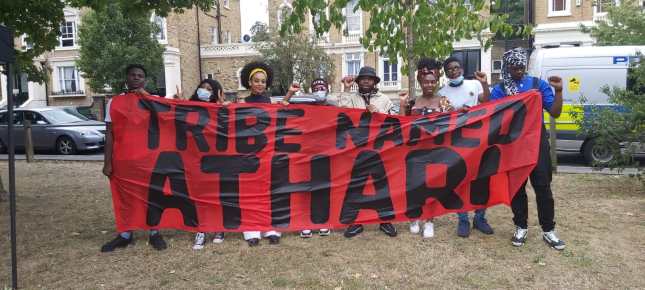
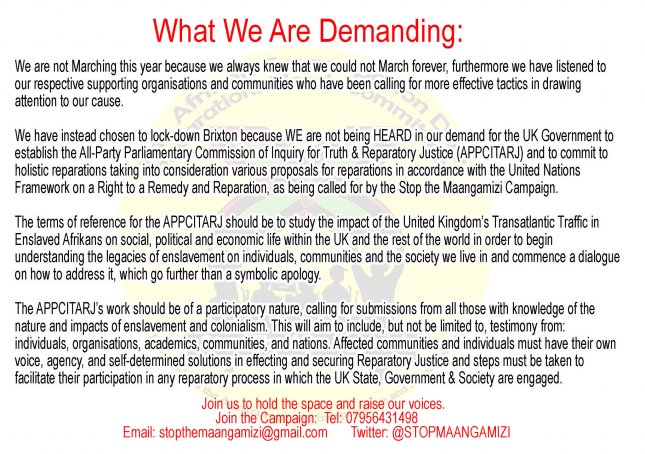 This is a link to an article we have on our website, with a template Stop The Maangamizi Postcard and template letter which can be amended from the perspective of allies supporting this demand.
This is a link to an article we have on our website, with a template Stop The Maangamizi Postcard and template letter which can be amended from the perspective of allies supporting this demand.















